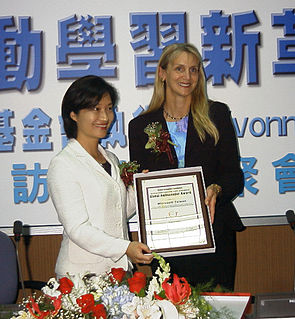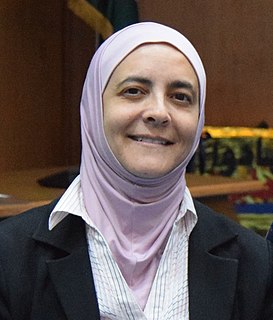Related Research Articles
Instructional scaffolding is the support given to a student by an instructor throughout the learning process. This support is specifically tailored to each student; this instructional approach allows students to experience student-centered learning, which tends to facilitate more efficient learning than teacher-centered learning. This learning process promotes a deeper level of learning than many other common teaching strategies.
Computer-mediated communication (CMC) is defined as any human communication that occurs through the use of two or more electronic devices. While the term has traditionally referred to those communications that occur via computer-mediated formats, it has also been applied to other forms of text-based interaction such as text messaging. Research on CMC focuses largely on the social effects of different computer-supported communication technologies. Many recent studies involve Internet-based social networking supported by social software.
Transformative learning, as a theory, says that the process of "perspective transformation" has three dimensions: psychological, convictional, and behavioral.
Transformative learning is the expansion of consciousness through the transformation of basic worldview and specific capacities of the self; transformative learning is facilitated through consciously directed processes such as appreciatively accessing and receiving the symbolic contents of the unconscious and critically analyzing underlying premises.
An online community of practice (OCoP), also known as a virtual community of practice (VCoP), is a community of practice (CoP) that is developed on, and is maintained using the Internet. To qualify as an OCoP, the characteristics of a community of practice (CoP) as described by Lave and Wenger must be met. To this end, an OCoP must include active members who are practitioners, or "experts," in the specific domain of interest. Members must participate in a process of collective learning within their domain. Additionally, social structures must be created within the community to assist in knowledge creation and sharing. Knowledge must be shared and meaning negotiated within an appropriate context. Community members must learn through both instruction-based learning and group discourse. Finally, multiple dimensions must facilitate the long-term management of support as well as enable immediate synchronous interactions.

Donald Alan Schön was a philosopher and professor in urban planning at the Massachusetts Institute of Technology who developed the concept of reflective practice and contributed to the theory of organizational learning.
Educational technology is the combined use of computer hardware, software, and educational theory and practice to facilitate learning. When referred to with its abbreviation, edtech, it is often referring to the industry of companies that create educational technology.

Teacher education or teacher training refers to the policies, procedures, and provision designed to equip (prospective) teachers with the knowledge, attitudes, behaviors, and skills they require to perform their tasks effectively in the classroom, school, and wider community. The professionals who engage in training the prospective teachers are called teacher educators.
Computer-supported collaborative learning (CSCL) is a pedagogical approach wherein learning takes place via social interaction using a computer or through the Internet. This kind of learning is characterized by the sharing and construction of knowledge among participants using technology as their primary means of communication or as a common resource. CSCL can be implemented in online and classroom learning environments and can take place synchronously or asynchronously.
A Knowledge Building Community (KBC) is a community in which the primary goal is knowledge creation rather than the construction of specific products or the completion of tasks. This notion is fundamental in Knowledge building theory. If knowledge is not realized for a community then we do not have knowledge building. Examples of KBCs are
Linda Marie Harasim, a "leading teacher, scholar and speaker on the theories and practices of online education, contributing knowledge, technologies, and practices to the field of technology-enabled learning," is a pioneer leading theorist of online education. She is a professor emerita in the School of Communication at Simon Fraser University (SFU) in Vancouver, British Columbia, Canada. Her six books and hundreds of articles about Computer-supported collaborative learning have been acknowledged as seminal works in the field.
A professional learning community (PLC) is a method to foster collaborative learning among colleagues within a particular work environment or field. It is often used in schools as a way to organize teachers into working groups of practice-based professional learning.
Fay Gale AO was an Australian cultural geographer and an emeritus professor. She was an advocate of equal opportunity for women and for Aboriginal people.
Intercultural communicative competence in computer-supported collaborative learning is the application of computer-supported collaborative learning (CSCL) to provide intercultural communicative competence (ICC).
A dialogue journal is an ongoing written interaction between two people to exchange experiences, ideas, or reflections. It is used most often in education as a means of sustained written interaction between students and teachers at all education levels. It can be used to promote second language learning and learning in all areas.

Dr. Yvonne Marie Andrés is an American educator who is recognized as an e-learning pioneer and visionary. Andrés is the co-founder of the non-profit Global SchoolNet (1984) and the founder of the Global Schoolhouse (1992). Andrés was named one of the 25 most influential people worldwide in education technology and was invited to meet with President Bush to launch the Friendship Through Education initiative (2000). Andrés is the creator and producer of International CyberFair and the US State Department’s Doors to Diplomacy program. Andrés frequently writes about highly effective education programs from around the globe that blend online and offline learning, while incorporating the latest neuroplasticity findings and Constructivist Learning methodology. Andrés has provided leadership throughout the US, Canada, Asia, Europe, Australia, South America and Africa and in 2007 Andrés was awarded the Soroptimist International Making a Difference Award for advancing the status of women and children. Andrés was selected as one of San Diego Magazine's Women Who Move the City, recognizing dynamic women who create positive change and contribute to the community. In 2021 Andrés was recognized as One of the Most Influential Women in Technology by San Diego Business Journal.
Socioscientific Issues (SSI) are controversial social issues which relate to science. They are ill-structured, open-ended problems which have multiple solutions.
David Garvin Moursund was an American mathematician, computer scientist, author and educator. From 2002 until his death, he was a Professor Emeritus in the College of Education at the University of Oregon. He wrote and taught extensively in the areas of computers, mathematics, and brain science in education.
The Technological pedagogical content knowledge (TPACK) framework describes the kinds of knowledge required by teachers for the successful integration of technology in teaching. It suggests that teachers need to know about the intersections of technology, pedagogy, and content. Specifically, how these areas of knowledge interact and influence one another in unique and specific contexts. In terms of teaching with technology, it suggests that it impacts not only what we teach but how we teach. This idea was in the zeitgeist in the early 2000s, with scholars working on variations of the idea.

Rana Dajani is a Palestinian-Jordanian molecular biologist and tenured professor of biology and biotechnology at Hashemite University. She earned her Ph.D. in molecular biology from the University of Iowa. Dajani is an expert on genetics of Circassian and Chechen populations in Jordan, also on conducting genome-wide association studies on diabetes and cancer on stem cells. Her work in stem cell research initiated the development of the Stem Cell Research Ethics Law and all regulations in Jordan. She is an advocate for the biological evolution theory in relation to the religion of Islam, and believes strongly in the education and empowerment of women, being a member of the United Nations Women Jordan Advisory Council. She is the recipient of the Jordan's Order of Al Hussein for Distinguished Contributions of the Second Class.
Jenny Hammond is an Australian linguist. She is known for her research on literacy development, classroom interaction, and socio-cultural and systemic functional theories of language and learning in English as an Additional Language or dialect (EAL/D) education. Over the course of her career, Hammond's research has had a significant impact on the literacy development of first and second language learners, on the role of classroom talk in constructing curriculum knowledge and on policy developments for EAL education in Australia. She is an Honorary Associate Professor in the School of Education, University of Technology Sydney.
References
- ↑ Gale Directory of Company Histories . Retrieved December 20, 2012